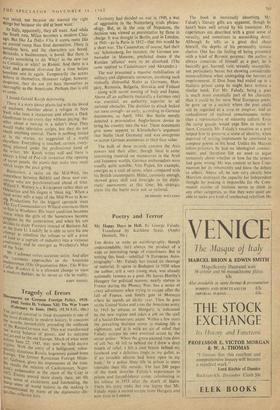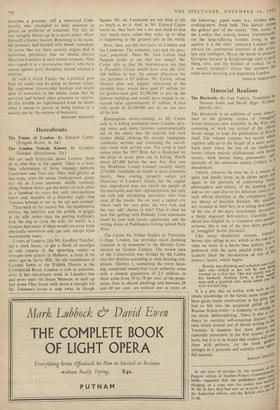Poetry and Terror
THE desire to write an autobioeraphy, though understandable, isn't always the product of a wide or interesting range of experiences. But in writing this book—subtitled 'A European Auto- biography'—Mr. Faludy has found no shortage of material. It opens in Budapest in 1938 when the author, still a very young man, was already. nationally famous as a poet. He leaves Horthy's Hungary for political reasons, nearly starves in France during the Phoney War, has a series of crazy adventures when trying to escape after the fall of France, and finally gets to Morocco where he spends an idyllic year. Then he goes to the United States and joins the American army. In 1945 he returns to Hungary, is welcomed by the new regime and takes a job on the staff of a Social-Democratic paper. Within a few years the prevailing Stalinist terror is making life a nightmare, and it is with an air of relief that Faludy accepts his own eventual arrest by the secret police: `When the green-painted iron door of cell No. 48 fell to behind me 1 drew a deep breath of relief. 1 felt a cool breeze behind my forehead and a delicious tingle in my gullet, as if an invisible abscess had burst open in my body.' In a police State life in prison is more tolerable than life outside. The last 200 pages of the book describe Faludy's experiences in prison and forced-labour camp, culminating in his release in 1953 after the death of Stalin. There his story ends; but one learns that Mr. Faludy made a second escape from Hungary and now lives in London. The book is immensely absorbing. Mr. Faludy's literary gifts are apparent, though he hasn't been well served by his translator. His experiences are described with a great sense of veracity, and sometimes in astonishing detail. Although he tells us a great deal about himself, the depths of his personality remain elusive. One has the feeling of being presented with a kind of Byronic persona: the author is always conscious of himself as a poet, he is basically gay, learned, vain, sexually susceptible. not particularly heroic but showing considerable resourcefulness when undergoing the horrors of imprisonment. If Don Juan had ended up in a Stalinist prison camp he might have written a similar book. For Mr, Faludy, being a poet is much more essentially part of his character than it could be for most West European poets: he grew up in a society where the poet could still be regarded as a scop or iongleur, and an embodiment of national consciousness rather than a representative of minority culture. Even the camp guards would urge him to recite to them. Certainly Mr. Faludy's vocation as a poet helped him to preserve a sense of identity; when deprived of writing implements he continued to compose poems in his head. Unlike his Marxist fellow-prisoners he had no ideological commit- ments, and therefore felt no need to argue tortuously about whether or how far the system had gone wrong. He was content to hate Com- munism for its inhumanity and leave the debate to others. Above all, he saw very clearly how Marxism destroyed the capacity for independent thought by making it impossible for the Com- munist victims of Stalinist terror to think in any other categories, so that they were quite un- able to make any kind of intellectual rebellion. He
describes a prisoner, still a convinced Com- munist, who attempted to hold seminars in prison on problems of Leninism. For this he was savagely beaten up by a secret police officer (himself a former fascist). Returning to his bunk, the prisoner, half-blinded with blood, remarked, 'It seems that our State security organs find it somewhat premature that we should discuss Marxism-Leninism in such mixed company. They also regard it as a provocation that I, who have sinned against party discipline, should conduct a seminar.'
In such a world Faludy the a-political poet kept his sanity and his grasp on human values. He underwent innumerable beatings and nearly died of starvation in the labour camp. But he survived and helped other prisoners to survive. In this terrible yet light-hearted book he shows what it means to persist in being human in a society run by the enemies of humanity.
BERNARD BERGONZI







































 Previous page
Previous page